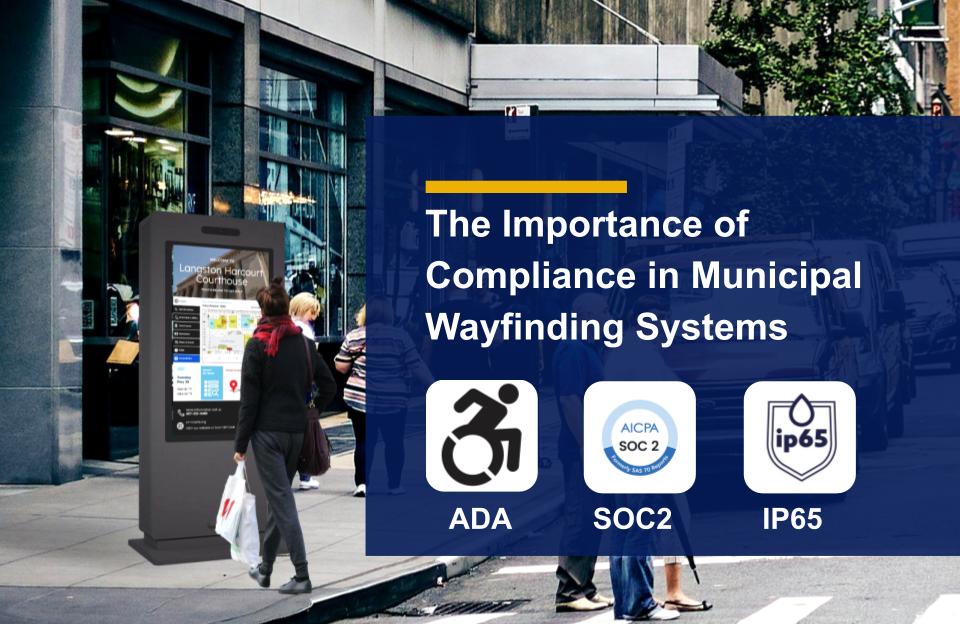Published: Jan 15th, 2025
Why Compliance Matters for Municipal Wayfinding Systems

Municipal wayfinding systems are more than just tools for navigation; they are vital components of inclusive, secure, and resilient urban infrastructure. Compliance with standards such as ADA (Americans with Disabilities Act), SOC2 (Service Organization Control 2), and IP65 ensures that wayfinding systems serve all users effectively, maintain data security, and withstand environmental challenges. These benchmarks not only enhance the usability and reliability of wayfinding kiosks but also reflect a city’s commitment to public safety and inclusivity.
ADA Compliance: Ensuring Accessibility for All
Accessibility is at the heart of modern urban design. ADA compliance mandates features that make wayfinding kiosks usable for individuals with disabilities. This includes features like tactile buttons, braille instructions, height-adjustable screens, and audio guidance for the visually impaired. By adhering to ADA standards, cities ensure that public spaces are inclusive and navigable for everyone, fostering equality and independence.
SOC2 Compliance: Protecting User Data and Privacy
Digital wayfinding systems often collect data to enhance functionality, such as usage patterns or user input. SOC2 compliance ensures that this data is handled securely, protecting it against breaches and misuse. This standard verifies that kiosks and their associated platforms follow stringent data security protocols, ensuring the privacy and trust of users. For municipalities, SOC2 compliance also minimizes risks of legal liabilities and public backlash due to data mishandling.
IP65 Certification: Durability in All Environments
Municipal wayfinding kiosks are frequently installed in outdoor locations where they face exposure to weather conditions such as rain, dust, and extreme temperatures. IP65 certification guarantees that these systems are waterproof and dustproof, ensuring consistent performance regardless of environmental challenges. This level of durability not only prolongs the lifespan of the kiosks but also reduces maintenance costs and downtime.
The Intersection of Compliance and Urban Innovation
Compliance standards are not merely regulatory checkboxes but essential components of innovative urban design. When municipalities invest in ADA, SOC2, and IP65-compliant wayfinding systems, they create infrastructure that is inclusive, reliable, and future-ready. These systems serve as a foundation for smart city initiatives, integrating seamlessly with public services, transportation networks, and emergency alert systems.
The Long-Term Benefits of Compliance
Meeting compliance standards enhances public trust, demonstrating a city’s commitment to accessibility, security, and sustainability. Additionally, compliant wayfinding systems attract more users, including tourists and individuals with specific needs, contributing to economic growth and community engagement. For municipalities, these benefits translate into a more connected, resilient, and inclusive urban environment.
Key Insights
Compliance with ADA, SOC2, and IP65 standards is non-negotiable for modern municipal wayfinding systems. These standards ensure that kiosks are accessible, secure, and durable, creating public spaces that cater to diverse needs. As cities embrace smart technologies, adherence to these benchmarks will remain critical in fostering trust, inclusivity, and innovation in urban navigation.
